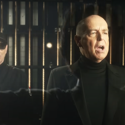
Yesterday we had a little sit down with Colin Weil – the producer behind the new meth-centric documentary, Rock Bottom. Today we’re having a heart-to-heart with the film’s director, Jay Corcoran.
After the jump, read what Corcoran has to say about meth’s emotional effects, why mentoring may save gay communities and how gay people, including gay cable companies, simply don’t want to help.
If you’re in New York, head on over to The Quad to see the movie! You may want to eat first, because you really won’t be in the mood after.
Queerty: Why did you choose to do this project?
Jay Corcoran: I was just fed up with where a lot of guys in the gay community were going. After all that we’ve been through with the AIDS crisis and to witness or hear about people self-destructing, I was like, “Why are people doing this?” Nobody was really talking about it. They were just like, “Oh, you don’t want to know” or “Let people have sex and do drugs”. After a while, you’re just going, “These people are self-destructing! It’s not a healthy choice.” Yes, everybody’s free to make choices, but it almost felt like there was this new wave of the AIDS crisis happening again. I felt like I needed to do something and shine a light on this really dark area of our lives – whether it’s the sexuality or the drugs. I know it’s not everybody, but I think that we have to examine this and why so many gay men are spinning out.
How about we take this to the next level?
Our newsletter is like a refreshing cocktail (or mocktail) of LGBTQ+ entertainment and pop culture, served up with a side of eye-candy.
QT: Somebody described meth as the perfect “post-AIDS” drug. Do you agree with that statement?
JC: I think it is, yeah, because it helps you forget and especially in part of our culture that are narcissistic and about being worshipped. I think for older gay men, especially, those who were once the life of the party, once they start losing their looks or once their bodies have been ravaged by the AIDS drugs, they can take meth and totally forget all the trauma of losing loved ones, of being thought of as a sexual pariah. They can take this drug and walk into a room with other people taking this drug and they’re all of a sudden back at The Roxy. They’re in hot demand. It’s all of that illusion.
QT: How does that explain people like J – the younger people?
JC: It also just reinforces that. For the younger people, it’s to be able to continue to be the hot guy at the party and prolong that. He can get up and do it and validates his narcissism. It’s the continued, [prolonged] validation.
QT: Almost everybody who spoke in the film mentioned the dissociation between love and sex in gay communities, but particularly in relation to meth. Do you think that somebody who is on meth can love?
JC: I’m not an expert, but my experience working with these people for two and half years: drugs and meth, addiction, is all very isolating. I think that while you’re on meth, it’s really hard to connect. You think you’re connecting, but you’re really not. It’s an illusion. I don’t think that you can really develop relationships and love and all of that while you’re on it. I don’t see how you can do it. It’s been really interesting watching these guys because the ones who are connected, who finally find a boyfriend or have a good support system, they tend to stay sober longer and don’t relapse as often. Once they disconnect, they tend to start isolating and using drugs again. I’m not saying it’s impossible [to connect], but it’s much harder.
QT: Everybody in the film expressed a desire for a deeper social connection. One doctor talked about how a lot of people who use meth feel uncomfortable in social situations, but I honestly don’t know anybody who does feel that comfortable in social situations, especially gay people, because there’s so much desperation for connection in our communities. How can we build a connection without relying on drugs?
JC: I really don’t know. That’s also another reason why I wanted to make this movie. Everyone can sit around and say, “Oh, our community sucks,” but I’m like, “Alright, there have to be ways that we can build communities.” We did it during the AIDS crisis, but all of a sudden with the protease inhibitors came, everyone said, “AIDS is over, I’m burned out, I can’t do it.” I think it’s taking some commonalities that we can use in our community and explore them and develop them… I think that’s a real conundrum that everybody is facing. Do we mentor? How do you make social centers that don’t revolve around bars or sex? I don’t know what the answer is. It’s very hard to get people to go on a Saturday to the gay and lesbian center for a social or square dancing. But I think that we can’t stop trying. It’s also about building a community in your own way; it’s about taking the initiative yourself in your own way and trying to build relationships. I think if everyone does it in their way, it could help the community.
QT: One thing I’ve always been a big proponent of is intergenerational communication. Watching the video and in our conversation with Colin, he discussed how we are now have the first generation of gay men who are not dying of AIDS – it seems to me that maybe that’s not the best thing, because if these men are having their own crisis, they’re not going to do any good for the younger gays, but I wish there were a way to bridge that divide in a healthy way. Does that make sense?
JC: I think that it’s really about looking at the reasons why people have survived all this time and looking at why they’re doing it and getting them help so they don’t continue to spiral. I love the whole idea of mentorship, because both people benefit – the older person benefits by helping out the younger person and the younger person benefits from the experience of the older person. I would love to figure out some sort of mentorship within the gay community, but if you ever mention that to people, they’re like, “Get out of my way”. But there’s definitely value to it and there are ways of getting people connected in a diverse way. I really think that you can start small – do you own thing. Making [the] film is my contribution. I think if everyone can figure out their contribution. People have to be almost entrepreneurial in their ways of connecting and finding their niche within the community. There will never be a global thing. Do you think there will ever be a time when gay men aren’t narcissistic and thinking about their abs and their dicks and getting high? There will always be circuit parties and substance abuse, that will always continue, but hopefully there will be some healthier choices and programs that will be developed.
QT: This is going to sound like a very conservative question, which I suppose it is, but do you think we’re paying the price for the sexual liberation?
JC: Stonewall or the 60s?
QT: I’m talking more about post-Stonewall.
JC: I think it was always there – even back in the 50s, the bathhouses – the sex scene was really big. I don’t think we’re really paying the price of the 60s revolution, because it was always going on and men were always hedonistic. I think that [what] we’re paying the price [for] is our denial. That’s what’s really coming out – the denial and the indifference to each other and ourselves. I don’t think it’s a real sexual revolution….
QT: As I was saying earlier – there seems to be a desperation for connection. It reminds me of when you have to electrons that repel one another. It’s almost like everybody is trying so hard that they can’t even see past their own lust for connection.
JC: Right. Exactly. And then what happens is that you’re so guarded and so afraid of getting hurt, that you become even more uptight and so bitchy. Go to a gay gym and watch how people ignore each other…
QT: Or objectify each other.
JC: Right.
QT: This certainly is a really timely subject. Hopefully it won’t be timeless.
JC: It’s been a very polarizing film. We submitted to probably thirty gay and lesbian festivals and less than half accepted us. There are a lot of gay men out there who do not want to see this, do not want to see this projected, do not want this out there. I’m very heartened by the response from this release. It’s definitely not a universal thing. We’re even having trouble getting it seen on cable. I’ve had major cable companies say, “I love the film, but there’s no way I’m going to let my audience see this.” We’re still playing up against a lot, but I’m glad that we’re building up a little grass roots [support].




















aaron silver
THE DAMAGING EFFECTS OF “THE CLOSET”
Since many of the recent sex scandals, particularly men of the clergy and how they have been unable to change their sexual orientation. I don’t think many gay men have not at sometime in their lives tried to rid themselves of their same sex orientation. It seems to me quite clear that even the clergy themselves cannot fight these natural urgings through prayer. Why then do does society believe that we lay people ought to be able to rid themselves of these so called unnatural urges? Therefore I believe it is high time that the phenomenon of “the closet†to be addressed and understood. I believe it is essential to discuss “the closet†to provide the necessary context from which to view some of the scandals that have happened recently to people in high profile positions. This discussion needs to be civilized, and our knee jerk reactions and judgments held in check. We need to discuss this subject with compassion. By the term “closetâ€, I am referring to the emotional place that many gay people go in order to keep any suspicion of their sexual orientation away from them. Many closeted gay men will often marry, become very involved in conservative religious dogma and/or become members of the clergy themselves. Whichever methods gays use, is an attempt to hide, or even used as a way of trying to rid themselves of their natural sexual inclinations out of shame for being something other than what they believe their God wants of them whether one is a man or woman. I am speaking primarily of men at this time because I believe men use the closet even more often than woman. The reason being is because of societies more narrow view and expectations of what behaviors are considered acceptable and “normal†for men. Woman can be tomboys much easier than men can be sissies. Of course not all gay men are effeminate by a long shot but that is a stereotypical image of gay men. Therefore men, whether they be gay or straight, will practice stereotypical masculine behaviors to thwart any suspicion out of fear and/or necessity. This is especially true if they feel pressure to do so to protect their careers, career advancement, fear of social denunciation or for a variety of other reasons whether they have difficulties reconciling their religious views with their natural inner feelings and same sex attractions. These are however the most common reasons for men to join the astounding numbers of other men that are also hiding in the closet.
The fear of being discovered can be enormous and absolutely terrifying. These men will often then do whatever they believe society expects from them. They will marry and have children out of desperation in an always unsuccessful attempt at suppressing these natural longings and hoping that they will eventually go away. These powerful feelings of attraction that we all know very well and have all experienced ourselves whether toward the same sex or the opposite sex, it’s all still the same. They may also marry and have homosexual secret liaisons with men and feel terrible guilt in doing so. They will do their very best to compartmentalize their lives the best that they can. However I believe and have found while researching my book that the longer one stays in the closet the more damage is done. It is generally very difficult to compartmentalize ones life for long without developing some emotional problems begin developing in varying degrees and manifesting in a variety of ways. Many closeted men develop coping mechanisms such as addictive behaviors of all sorts whether they are alcoholism, prescription or non prescription drug abuse. They may develop addictions to pornography, sexual addiction or other self-destructive ways of acting out. Once again unfortunately the longer one stays in the closet there will then also generally be more victims because of their closeted lifestyle choice. The victims may be their wives and children, their friends, parents and siblings. All feeling like they have been betrayed and deceived when the closeted individuals true nature is discovered as it was for ex-governor of New Jersey, Mr. McGreevy, ex-congressmen Foley and now the president of the Evangelicals, to name just a few of the staggering number of men that have also been hiding their true selves. I feel very sad for the victims as well as I very much understand the humiliation, despair, and profound depression that the closeted individuals feel that soon follows once that door to the closet is flung open. For some, the shame and fear is just too unbearable and suicide seems like the only alternative to ending their unbearable pain and shame. Suicide rates are much higher than heterosexual men.
Society needs to take some responsibility with this matter of the closet by being more accepting of alternative lifestyles. Without the closet, try and imagine how much less pain many people and families would have to endure. Not only the ones that feel that living in the closet is their only alternative, but for the victims that find themselves feeling betrayed once the secret comes out.
We as a culture have some soul searching to do on this matter and not be so self-righteous. There are a variety of ways of loving and living. We need to accept the fact what seems to be normal for some is not necessarily normal for all. The closet can cause deep and very troubling emotional problems that can eventually manifest in abhorrent behaviors. Addictions of all sorts are much more common among gay men than their heterosexual counterparts. However, because there is still so much shame yet in this day and age in our rather hypocritical puritanical society, causes many gays not to seek help concerning issues they may be struggling with from the appropriate professionals. I generally do not recommend clergy because it can cause further damage due to their religious agendas which can deepen one’s shame and depression. This is a very complicated issue and I don’t have all the answers. I am however certain that society has to become more compassionate about people with innate same sex attractions. If they do not, we will continue to shame many gay people enough so that it will continue to inhibit many from being true to themselves and therefore to their loved ones.
One can read more about this issue and many other disturbing issues involving gay culture of today in my new book; “why gay men do what they do”, an inside look at gay culture. Thank you, Aaron Jason Silver
http://www.aaronjasonsilver.com
aaron silver
besides the comment I posted, I would like to congratulate Jay Corcoran for his insight into an issue that I have been struggling to shine a bright light on by writing a book about gay culture. We are indeed a culture in trouble. Thanks again for sharing your insight into a very real problem. Aaron Jason Silver http://www.aaronjasonsilver.com
24play
Uh, Aaron, this blog does accepts ads.
Next time, buy one.
Dawster
In all honesty, meth isn’t the worst drug out there… whatever drug you (personally) fancy is the worst drug out there, and that changes from person to person… and year to year. The only reason why meth is a big issue today is because people got tired of ecstasy yesterday, and the only reason why we were talking about ecstasy yesterday is because people got tired of cocaine the day before.
I will always agree that meth is a VERY dangerous drug… but I find it really odd that I have seen more people have unprotected sex and make bad choices (like driving) leading to the immediate death of themselves and others through the use of alcohol…
Me and my friend got QUITE heated about Peter Staley’s campaigns in New York writing forcefully, trying to explain to him how counter-productive his campaigns were… to no avail. He was not able to properly defend himself or his posters, and true to our warnings… Meth use, HIV, and AIDS statistics went up in NYC over the next year. I won’t go into the details of all that shit here, it’s not the place.
I have done drugs… I haven’t in several years. I stopped because of the death of my father and I didn’t think it was respectful to do drugs while mourning. It was then that I found I had a bigger problem… alcohol.
So for me personally, I get annoyed with the OVER-coverage of an old subject that’s starting to fade in the light of how a pharmaceutical-drug trend that has taken over. Meth is on its way out… just like in the 70’s, and it will be back in about 30 years in full force, with nothing being solved.
We should be fighting that path that leads to drug use… not the individual drug itself – as the drug will change depending on person and popularity (or availability)… but those issues are often left untouched. I admire that Jay Corcoran is attempting to bring that mentality to the screen… I hope he does better than Oprah did (“one hit and your addicted for life!!!!â€). Honestly, I really hopes he brings the bigger issue.
As we told Peter Staley… ‘if something doesn’t work, try the opposite… stop beating a dead horse.’ That didn’t stop him… numbers are still going up. Why doesn’t anyone learn? I really hope that “Rock Bottom†breaks from the norm… so as to get people to wake up and take care of our own… I really, really do.
Dawster
and what the hell is up with all these long posts??
(lol)
poodle
i see all these angry faces.
talking about what might have been.
there’s no easy way out.
there’s no shortcut home.
some things are worth fighting for.
dizzyspins
Its not MY fault I have a raging drug habit and contracted HIV–its the CLOSET’S fault. Im not my fault that the only intimacy I have is with anonymous tricks from Manhunt–Its the CLOSET’S fault. Its not MY fault I ruined some poor woman’s life by conning her into a loveless marriage, its the CLOSET’s fault!
Wake up! You are not 10 year old children. This is not Wichita in 1957. These Meth heads are not suffering from homophobia, but rather reckless self-indulgence. Im hardly an angel, but when I see the consequences of my actions bite me on the ass, I take responsibility and try to do better next time. These wastes-of-space are everything the homo-haters say about gays. And the sooner they all drop dead, the better.
There is real life going on and all anyone can talk about is how the Roxy is closing. Good–I hope they let me operate the wrecking ball!
nystudman
Totally agree with Dawster & Dizzyspins. I’m sick of gay men blaming meth use on their rejection by parents, homophobia, etc. Everyone goes through shit growing up. You get over it, or you go into therapy.
We’d do better to study the physical receptors that trigger addiction in some, casual use in others.
nystudman
Totally agree with Dawster although Dizzyspins is a bit tougher love than I am. I’m sick of gay men blaming meth use on their rejection by parents, homophobia, etc. Everyone goes through shit growing up. You get over it, or you go into therapy.
We’d do better to study the physical receptors that trigger addiction in some, casual use in others.